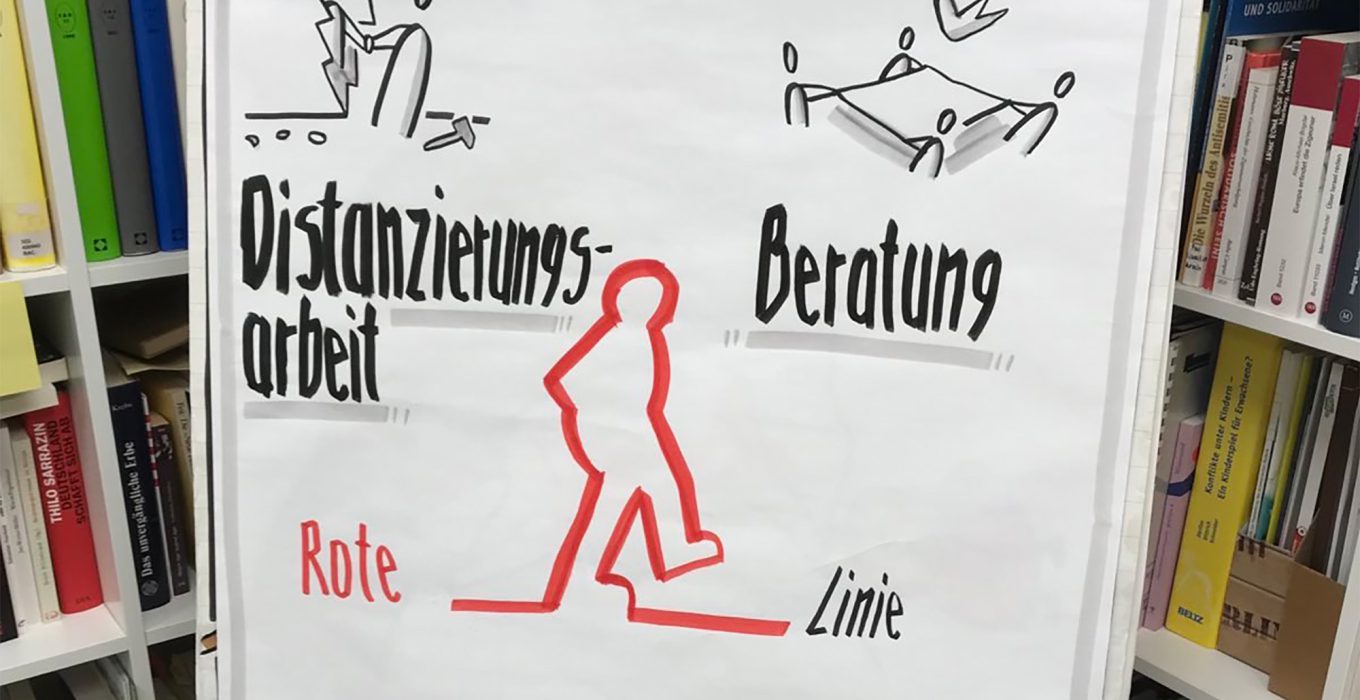Deradicalisation
In our deradicalisation work, we focus on young individuals and groups who repeatedly attract attention through racist, discriminatory and other right-wing extremist statements and actions – including their first criminal acts.

Our work
We see the individual, develop trust and build relationships.
We ask about their own interests and help them to formulate life goals.
We deal with their questions and conflicts.
We promote a positive self-image and value decision-making and social participation.
We provide support during lengthy change processes.
We help to minimise risks and avoid criminal offences.
Distancing work as individual assistance
Distancing work as a group programme
When young people develop or display right-wing extremist attitudes and a willingness to act, this can pose a threat to themselves and others. Signs may include: discriminatory or right-wing extremist statements or contributions, contact with right-wing extremist individuals or groups, wearing right-wing dress code, listening to or singing right-wing extremist music, forbidden greetings, distributing right-wing extremist pictures or videos, physical confrontation or violence. Right-wing extremist world views can harden, and integration into the scene can progress. Living together at school, in the family or during leisure time can be permanently impaired and the risk of criminal offences and violence can increase.
At the same time, they are in a learning and development phase and changes are therefore possible. However, young people need intervention, support and encouragement as early as possible in this process. As part of our distancing work, we therefore seek contact with young people at risk of and orientated towards right-wing extremism – if possible, as soon as the first signs become apparent.
Individual case support is usually provided in an outreach and confidential manner in the young person’s living environment, often outdoors. The methods and topics are tailored to the individual needs of the young people. The individual case work includes, among other things Building confidence and strengthening intrinsic motivation and the development of new perspectives; developing a positive and stable identity outside the right-wing extremist scene; dealing with self-perception and the perception of others, feelings, own boundaries and the boundaries of others; encouraging reflection on right-wing extremist ideologies and their effects as well as one’s own behaviour; coming to terms with one’s own life story and relevant relationships; promoting social, educational and economic integration.
Individual case help can be provided on a voluntary basis. As a rule, however, young people are obliged to attend as part of youth welfare services, educational measures at school, diversion proceedings or directives issued by the judiciary. An appropriate period of time or number of appointments is determined in advance. Voluntary continuation beyond this is possible if required. The programme is also explicitly aimed at female adolescents and young adults.
If you have any questions about this programme or a specific need, please contact us.
Distancing work as individual assistance
Distancing work as a group programme
If several young people as a group are conspicuous for statements or actions that can be attributed to right-wing extremist attitudes (discrimination, racism, xenophobia, anti-Semitism, wearing right-wing dress code, listening to right-wing extremist music, distributing right-wing pictures or videos, violence, etc.), it can be useful to work with them as a group on specific occasions. The groups should not be too large (three to seven young people) and the group should be more homogeneous in terms of age. They can be male, but also explicitly female adolescents.
The group programme is usually arranged by institutions, caregivers or parents after initial offences and takes place in an obligatory context: educational measures, diversion proceedings, directives within the framework of the justice system. The institutional framework for participation must be clarified in advance. The group programmes take place at a time to be agreed in advance.
Various areas are addressed in terms of content and methodology, e.g. building confidence, strengthening intrinsic motivation and developing new perspectives; developing a positive and stable identity outside the right-wing extremist scene; dealing with self-perception and the perception of others, feelings, one’s own boundaries and the boundaries of others; reflecting on right-wing extremist ideologies and their effects as well as one’s own behaviour; coming to terms with one’s own life story and relevant relationships; promoting social, educational and economic integration.
If you have any questions about this programme or a specific need, please do not hesitate to contact us.